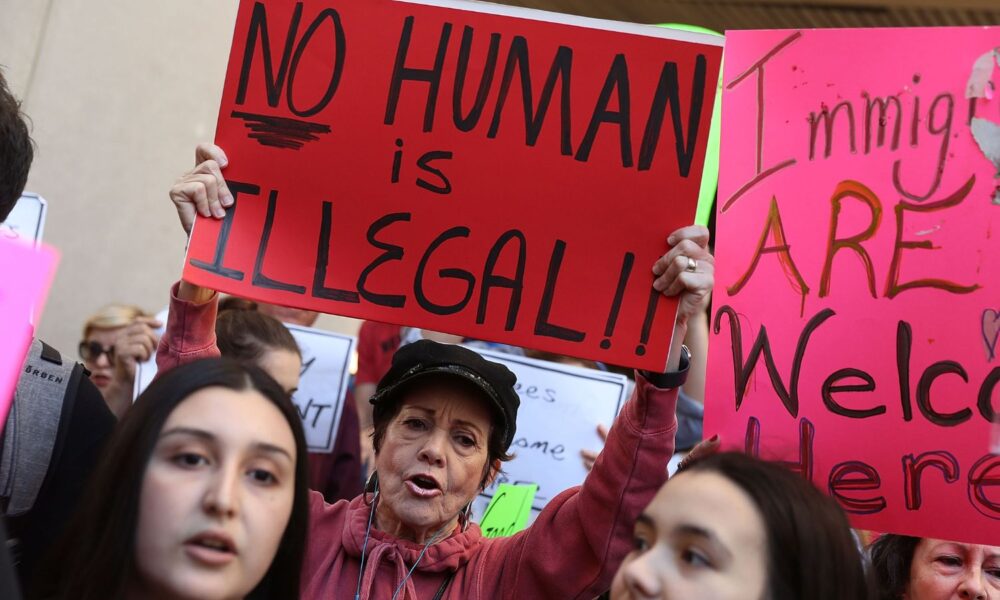President-elect Trump’s threats to swiftly implement a policy of mass deportation for immigrants in the United States without legal status, as well as end programs that provide lawful temporary protected status for many immigrants, are inhumane. Immigrant rights groups and legal experts have rightly sounded the alarm and are working actively to fight back and resist these actions, which could be announced on Day 1 of the Trump presidency. All of us—whether we or our families, friends and community members are directly impacted or not—have a stake in understanding why these policies are so harmful, morally reprehensible, and have no place in a democracy.
We in the US are part of a country whose history and present-day social and economic realities are deeply intertwined with and built on the experiences of immigrants, enslaved African Americans, and Indigenous peoples. Owning that history—the good and the bad—is a crucial part of what it means to be an American. And it’s the first step in charting a path to a better, fairer future for our country.
The current US system of immigration is clearly broken, and across the political spectrum there is a recognition that reforms are urgently needed. I am not an immigration expert so I will not opine here on the details of those reforms.
What is clear—or should be clear—to all of us is that if we arbitrarily judge some immigrants to be “better” than others, we will inevitably risk reinforcing a system that is based on biased and unequal power and economic structures that are pervasive in the world today. All too often, current legal pathways to immigration privilege a subset of people while shutting out many who work equally hard and are equally deserving.
As my colleague Karen Perry Stillerman points out, in addition to being morally repugnant, mass deportation programs would have a significant negative impact on our nation’s food system, which could not function without the labor of immigrants.
As another example, as extreme weather and climate-related disasters mount across our nation, it is often immigrants who help to do the difficult and dangerous work of cleaning up debris and rebuilding homes and infrastructure as quickly as possible. As a recent news article points out:
“The fact is that the people who rebuild those areas—from Palisades to Malibu to Altadena—it’s immigrant construction crews,” said Pablo Alvarado, co-executive director of the National Day Laborer Organizing Network. “They’re the ones who are the second responders.”
Unfortunately, climate and fossil fuel-driven disasters are also contributing to a growing toll on people across the world, destabilizing economies, threatening livelihoods, health, water supplies, and food security. If we fail to sharply curtail heat-trapping emissions and invest in climate resilience, the numbers of people suffering harm will rise steeply, and many might even find themselves forcibly displaced both at home and abroad.
Rich nations like the United States (which is the leading historical contributor to global heat-trapping emissions) have the capacity and the responsibility to advance resilience at home and provide climate finance to help lower-income nations transition quickly to renewable energy and adapt to climate change. They also have a responsibility to help address climate loss and damage and displacement with a human rights-centered approach.
Hateful political rhetoric from President-elect Trump and his allies that demonizes and dehumanizes immigrants shows political leaders who are more interested in scoring cheap political points through fearmongering and fanning the flames of xenophobia, rather than acknowledging the basic humanity and incredible contributions of immigrants to our economy and our society.
This is not a new tactic. Across history, here in the United States and abroad, in uncertain economic times, extremists have often targeted immigrants and made harmful and deceptive claims blaming them for all the ills in society. Punching down, further marginalizing those who are fearful and may not have access to resources to defend themselves, is also a classic tactic of bullies and doesn’t solve the urgent problems facing our nation and our planet.
It’s up to all of us to stand up for the facts and stop allowing politicians to misuse the important issue of immigration policy to spew hateful lies as a convenient way to further their narrow interests. Mass detention and deportations will tear apart families, cause lasting trauma and harm, and set back health and education in immigrant communities especially for children, alongside undermining the the U.S. economy.
We all know instinctively that leaving one’s familiar home and embarking on a dangerous journey to a faraway place, with very few resources and no guarantee of safety, is often an act of desperation—especially when bringing children. But for luck, this could be the plight of anyone in any country around the world.
Seeing our shared humanity and acting based on that principle is the best path forward on immigration and for our country of immigrants.
Here are some resources to learn more. Please share them with anyone who needs them.
- American Civil Liberties Union: Know Your Rights/Immigrants’ Rights
- National Immigration Law Center: Know Your Rights: What to do if You Are Arrested or Detained by Immigration
- National Immigrant Justice Center: Know Your Rights: If You Encounter ICE

